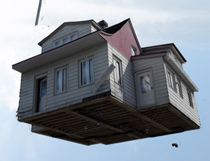The Return
by Dany Laferrière, trans. David Homel,
Toronto: Douglas & McIntyre, 2011
227 pp., $22.95
Reading anything by Dany Laferrière is emotionally exhausting, and his latest work, The Return, required several naps for me to get through it. Marketed as a novel, The Return bends genre is more than one way. It includes poetry and prose, and while it is nominally a novel, it’s obviously deeply infused with memoir.
The original French book L’énigme du retour (2009) won the Prix Médicis, and David Homel, who has translated other works by Laferrière, has done a wonderful job with challenging material, in particular with the poetry, always a tricky genre to translate.
In this book the narrator is Dany Laferrière, and he learns of his father’s death. Windsor Laferrière (also Dany’s real name) left Haiti many years ago, and his son decides to return, making a kind of pilgrimage for both himself and his father. The book works on the juxtaposition of just about everything: life/death, Montreal/Port-au-Prince, hot/cold, son/father, father/mother, food/hunger, wealth/poverty, home/exile. The obvious question is whether a person can go home again, and what develops in this work is the sense that home shifts. Haiti was once Dany’s home, and his mother and sister still live there. But Montreal has been his home for decades, and no matter where he is, he lives with a sense of displacement.
Displacement has driven his father to despair. Forced to leave Haiti because of his political activity, Windsor ends up in Brooklyn, and when Dany tries to visit him, Windsor has remade the past. Dany says, “I can still hear him yelling that he’d never had a child, or a wife or a country. I had gotten there too late. The pain of living far from his family had become so intolerable he had to erase the past from his memory.†But Dany cannot erase the past: he must confront it by travelling to Haiti and his father’s birthplace.
After he attends his father’s funeral, Dany goes to Haiti, and the book overflows with descriptions of a shattered and yet beautiful country. In one of the more successful poems, “The Human River,†Dany notes:
I step into the street
to bathe
in the human river
where more than one swimmer drowns
each day.
The heat of Haiti contrasts with the icy winter of Montreal, and the lush tropical setting of Haiti contrasts with the impoverishment of most of its inhabitants. Haiti’s corrupt and brutal governments forced both father and son out, by a father and son—Papa Doc and Baby Doc Duvalier—and while they are gone, the mess that is Haiti continues to fray.
The personal journey is both physical and psychological, and Dany Laferrière is profoundly skilled at putting angst into words. In most cases, the prose passages work better than the poetry, which at times is simply prose broken up on the page. But there are deliriously good poems, and overall the book is an excoriation of man’s inhumanity to man on many levels. And while that makes it challenging to read, it also makes it necessary to read works such as this one.




No Comments so far ↓
There are no comments yet...Kick things off by filling out the form below.